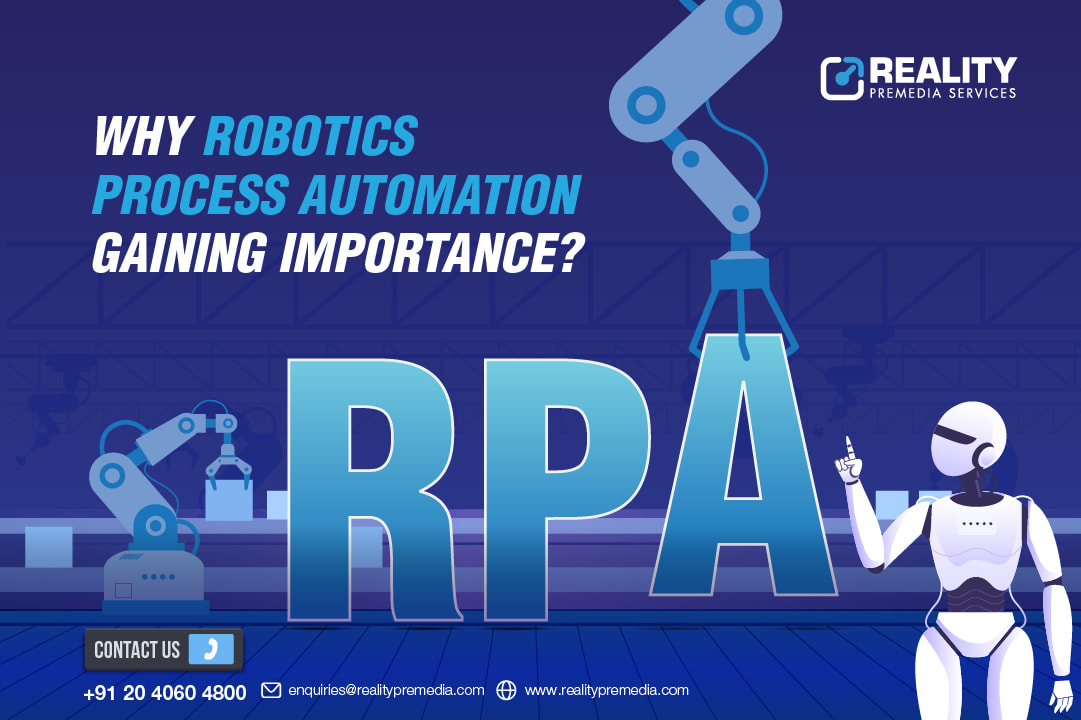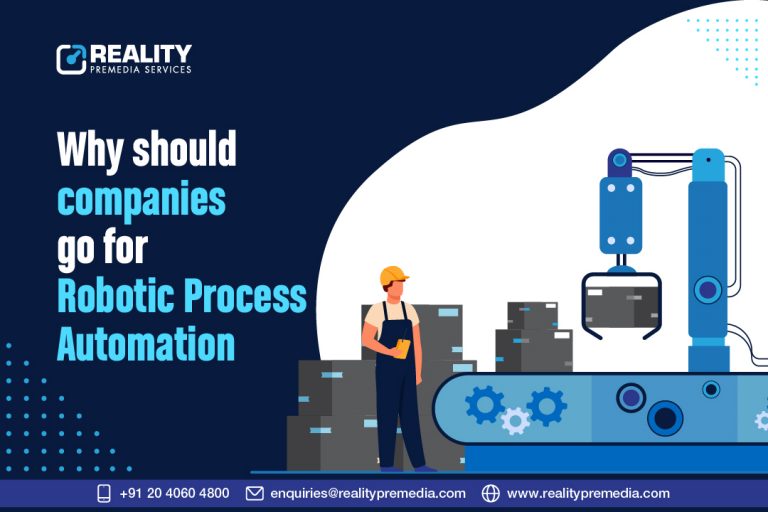|
Back to Blog
2022 will be the year that businesses get back on track after a year of unparalleled disruption. Many will be looking towards technology and automation to improve efficiency, reduce costs, and build organizational resilience. One technology that should be at the forefront of those conversations is robotic process automation (RPA). Robotic Process Automation (RPA) technology, although a relatively new technology, has managed to gain a lot of attention in the corporate world over the past couple of years. Business owners and CTOs alike are beginning to take notice. Robotic process automation (RPA) offers several benefits over traditional automation solutions. It enables us to save costs and free up resources with a low, non-invasive technical barrier. Other advantages include increased productivity, higher accuracy, the ability to streamline regulatory compliance, faster service, and higher consistency.
RPA revenue was expected to reach close to $2 billion in 2022, according to Gartner, and will continue to grow at double-digit rates through 2024. As more and more companies around the world employ RPA, it is swiftly becoming a ubiquitous and critical technology for the competitive company. Low-code and no-code solutions are helping organizations accelerate digital transformation by allowing non-developers and non-IT specialists to participate. Accounting and invoicing, data management, hiring and on-boarding, payroll, and much more can all be aided by it. Specifically, RPA is mainly used to automate business processes such as:
Finance, accounting, operations, and technology groups are all adopting RPA, which is a rapidly growing business. According to LinkedIn estimates, 72 percent of all firms are expected to employ RPA at some time in the next two years. Major Benefits of RPA Cost effective Cost savings are virtually instantaneous using RPA. Reduced manpower and time, as well as better precision, are all advantages of RPA. Cost reductions of over 30% can be gained by automating tasks. Reduced risk By providing scalability, reducing errors, and boosting compliance, RPA may drastically minimize operational risks. To get more consistent results and delivery, automation is essential. Improved Productivity Because RPA can automate repetitive and time-consuming processes across your organization, your employees will have more time to focus on more important duties, enhancing overall productivity. This leads to increased staff happiness and engagement, as well as a better customer experience. RPA Bots may work nonstop for 24 hours a day, 7 days a week. This is a significant benefit over human workers. For firms trying to improve efficiency, the ability to work uninterrupted and with greater accuracy is a significant benefit. High accuracy When done correctly, robotic process automation decreases the likelihood of errors in any given operation by effectively replacing the human "error" factor. Less errors mean lower costs, less wasted time, higher accuracy, and, depending on the process, increased regulatory compliance where errors can have serious consequences (e.g., personal data related tasks) and much more, which brings us to regulatory compliance. Start Your RPA Journey Today During unpredictable times, automation is a crucial tool for making your business more efficient and stable. RPA is one of the most straightforward methods to set up and scale to new activities and departments. Consider hiring a seasoned RPA Solutions provider like Reality Premedia Services if you're interested in RPA initiatives for your company.
0 Comments
Read More
Back to Blog
Why Companies Need Robotic Process Automation Now!
There’s no doubt that almost anything today can be done by a computer. If that’s the case, why do we humans find ourselves working more than ever; blurring the lines between work life and personal life; and most importantly facing the probability of burning out, on a daily basis? Makes you think, doesn’t it? At Reality Premedia, we’re in the business of working with machines, not like machines. And one way to do that is for companies to adopt Robotic Process Automation (RPA) now! Let’s take a closer look. What is Robotic Process Automation (RPA)? Believe it or not, most people are actually already familiar with RPA, without even knowing it. Remember the last time you called your mobile operator or your bank and were greeted with an Interactive Voice Response System (IVRS); that was an example of RPA in action. Or even when your doctor sends you text messages reminding you to visit. These are just the tip of the iceberg. RPA is a system by which humans can instruct machines to execute repetitive time-consuming manual tasks. The term ‘robotic’ in RPA, refers to software robots. These robots aka bots are designed to imitate the way humans interact with computers performing our tasks with more speed and efficiency. Combined with some aspects of artificial intelligence and machine learning techniques, the scope to use RPA in business is massive. This along with greater levels of sophistication has made RPA popular across every sector of work. Why Does My Business Need RPA in 2021? The most drastic change that came about from the pandemic was the need for organizations to move their business and backend processes online; most managed to do so quite well. Fortunately or unfortunately, this digital revolution is here to stay. That means that companies need to find a permanent solution, quickly. RPA is Easy to Implement: RPA systems are designed to make work easier for everyone, including developers. These programs use comparatively less coding, so they can be implemented sooner and non-technical staff can adapt to them easily. They also do not require any changes to the existing IT setup because they work as an add-on to current applications. The other aspect that makes them easy to implement is the fact that they can be implemented in phases. This allows companies to begin by automating just a few simple tasks before they take on more crucial processes. As the world faced communal grief, anxiety, and depression, workers across the globe experienced a shift in perspective. Along with one’s physical health, mental health took precedence over all else. RPA Boosts Employee Morale: Any job no matter how exciting comes with its share of the mundane. RPA systems were created to eliminate this. By automating high-volume repetitive tasks, it allows employees to focus on the more important, strategic aspects of the job. The recent increase in the popularity of online courses shows that employees are eager to up-skill themselves. By implementing RPA, they will have more time to do this without affecting their productivity. This doesn’t just boost morale and improve mental health; it increases the bottom-line of organizations as well. Speaking of the bottom line, the pandemic drastically affected everybody’s bottom line, irrespective of sector. Now, companies are not only struggling to survive, they need to make up for the losses they faced. RPA Increases Customer Satisfaction & Revenue: You might be wondering how automating simple internal tasks, can increase customer satisfaction. RPA does this in two ways. As mentioned above, creating time for employees to focus on high-value tasks helps them finish more work in less time, giving them the time to attend to customers better. Additionally, RPA eliminates human error altogether, as long as it is programmed correctly. When a bot does a repetitive task, it doesn’t face monotony, needs a break, or makes silly mistakes that could cost the company a lot of money. The end result is an optimized, highly efficient workflow process. The pandemic brought with it pandemonium. Lockdown rules & regulations were and are constantly being changed; rules regarding businesses, whether essential or not are also in a state of flux. And to make matters worse every person who interacts with a business today has embraced technology and expects the same from a business. RPA Improves Accuracy & Compliance: All these changes have increased the risk of both human error and fraud. RPA helps businesses log each step of their work, ensure they follow the latest compliance rules and helps them find & fix errors quickly. From the depths of data, RPA also helps companies extract & manage the most relevant high-quality information, making accuracy a part of day-to-day operations. As we experienced heart-warming stories of people going out of their way to help complete strangers, perhaps the most important lesson the world learned the hard way, was how to work together. RPA Helps Organizations Work Cohesively: With the right programming, RPA bots can easily correct errors amongst multiple departments within an organization. Take, for example, filling up a form. If your form is missing some data or something is filled incorrectly, the form is returned to you. With RPA however, if the data exists somewhere within your organization, the bot can fill it up automatically, essentially omitting the need for one form, to be checked by multiple departments. RPA has the potential to transform the post-pandemic world of work, permanently. As you can see these bots are designed to enhance our productivity. After all, work only works when you’re happy at it. Contact us to begin your journey with RPA. |
Drop us a line
|

 RSS Feed
RSS Feed



